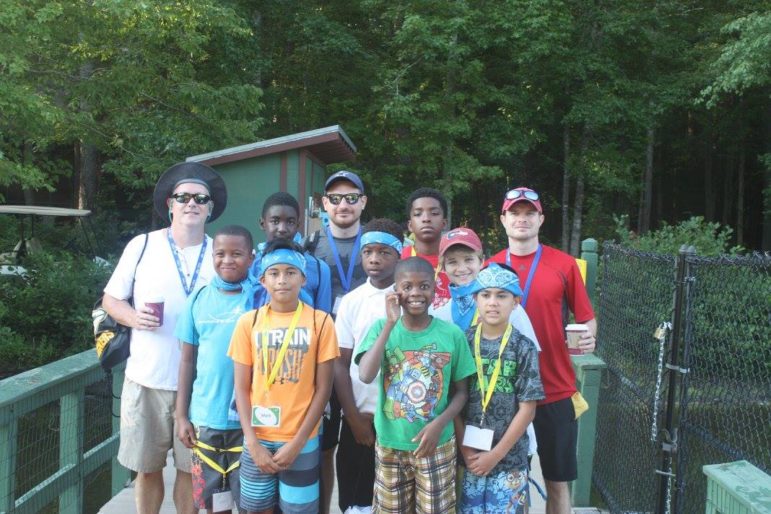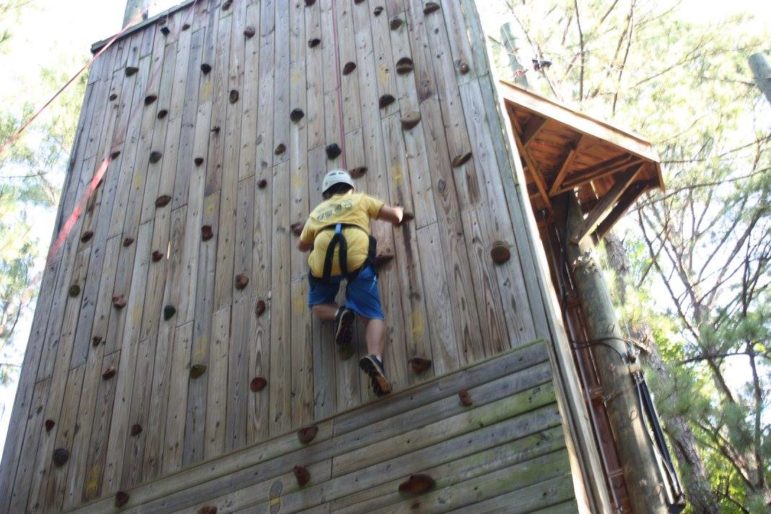
Photos courtesy of Kate's Club
At Camp Good Mourning, kids participate in regular camp activities, building fun, mentoring and community into grief support.
Teen girls taking a chance climbing a telephone pole belayed by their friends, a 14-year-old learning to ride a bike, children visiting a farm and milking a goat … This may not be what you think of when you think of grief support for children and teens, but these are some of things I witnessed at a bereavement camp for kids, just one of the programs at Kate’s Club, an Atlanta nonprofit providing services for kids ages 5 to 18 who have experienced the death of a parent, sibling or primary caregiver.
Camp is a highlight of the year. At this year’s camp, 238 children and teens were able to play, share and grieve. At Memory Walk this past Sunday, people shared stories about their loved one along a story-telling path and left messages of love on a sidewalk chalk mural. Families, volunteers and community members came together to support each other, and raise money and awareness, since today is National Children’s Grief Awareness Day.
One in seven people will experience the death of a parent or sibling before the age of 20. This is not a small number, yet ongoing support is not available in many areas. The organization was started 13 years ago by a young woman, Kate Atwood, whose mother died when she was 12, and though she was part of a loving family they did not know how to grieve together. She also did not know any other kids who had experienced the death of a parent. Kate wanted a place to have fun and be with friends who understood. The organization has since grown to be a model grief support program through fun, community and long-term support.

When I tell people about my work, their first response is usually, “Oh, how sad, how can you do that?” I usually say, “At Kate’s Club, we have sad moments, but we are not a sad place.” Children and teens grieve differently than adults. They usually grieve in smaller doses over a longer period of time. They still want to be kids and have fun. However, they face unique challenges and may not feel understood by most of their peers.
We work around social, recreational and therapeutic model of support. At camp, we do traditional, fun camp activities, but they are more than just fun. They build confidence — something that can be lacking in grieving youth. They also serve to help kids support one another and build community.
We also play games and activities that help kids share their stories and develop healthy coping. For example, while playing a life-size game of Battleship, we talk about how we handle the “unexpected” things in life, like losing someone we love. We teach them that grief is a natural reaction to loss and that all the complicated feelings that accompany a loss are normal. Saturday night of the weekend camp we have a luminary walk where the entire camp walks in silence to honor our loved ones. At our Memory Walk family and friends walk together, supporting one another. These activities really go to the core of Kate’s Club, which is to build healing communities. Having a supportive community is key to coping with grief.
Our program model also includes the support of “buddies” or volunteers. Buddies are adult volunteers, many of whom experienced the death of a parent or sibling when they were younger. They work with our members at every program in a group setting. Our buddies often say they wish they had a program like Kate’s Club when they were younger. A nice side effect of our program is that our volunteers’ involvement in Kate’s Club often helps their own healing.
Many kids come into Kate’s Club with reluctance. They are afraid they are coming into a place where they will be forced to talk about their feelings in a sad and somber environment. They usually leave the initial orientation with a very different feeling, like they have found a community of support and a place where it is OK to have fun again.
For national resources and information about grief, or resources by state, please see ChildrenGrieve.org.
Lane Pease is program director at Kate’s Club in Atlanta, which also offers resources for how to support and talk with young people about grief.





























